The book of Acts provides us with important insight into what first century Christians believed and taught. In this post, we’ll examine portions of Acts chapter 17 to discover what Paul taught the citizens of Thessalonica about God. More specifically, we will look to see if the apostle taught the doctrine of the Trinity or the deity of Christ, both said to be foundational to the Christian faith.
Thessalonica, located in what is now Turkey, was the capital of one of four districts in Macedonia. Paul visited this port city on his second missionary journey.[1] As was Paul’s custom, he went to the synagogue to share the message he had been given:
Acts 17:2-3 (NASB) And according to Paul’s custom, he went to them, and for three Sabbaths reasoned with them from the Scriptures, 3 explaining and giving evidence that the Christ had to suffer and rise again from the dead, and saying, “This Jesus whom I am proclaiming to you is the Christ.” (emphasis added)
Note that the source of Paul’s authoritative teaching was Scripture. Later, in this same chapter, Luke categorizes Paul’s message to the Thessalonians as being the word of God.[2] What was the message that Paul shared from Scripture? That Jesus was a God-man? Or that the Christ was the second person of the Trinity? Or perhaps that Jesus pre-existed in heaven as the Word? All of these statements are key elements in today’s orthodoxy. But Paul is not recorded as teaching the Thessalonians these key doctrinal points. Instead, the text says that Paul used the word of God to prove that Jesus is the Christ spoken of in Scripture and that it was God’s plan for the Christ to suffer and be raised from the dead.
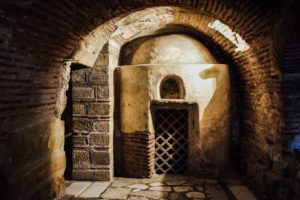
How did the Thessalonians respond to Paul’s message? Some Jews, along with a large number of God-fearing Greeks, and a number of leading women, were persuaded by the former Pharisee that Jesus was the Christ.[3] Conversely, there were other Jews who became jealous and rejected Paul, his companions, and their message:
Acts 17:5-9 (NASB) But the Jews, becoming jealous and taking along some wicked men from the market place, formed a mob and set the city in an uproar; and attacking the house of Jason, they were seeking to bring them out to the people. 6 When they did not find them, they began dragging Jason and some brethren before the city authorities, shouting, “These men who have upset the world have come here also; 7 and Jason has welcomed them, and they all act contrary to the decrees of Caesar, saying that there is another king, Jesus.” 8 They stirred up the crowd and the city authorities who heard these things. 9 And when they had received a pledge from Jason and the others, they released them. (emphasis added)
What was the message that the Jews found to be so offensive so as to incite violence against believers? That the man from Nazareth was God? No. Rather, that the crucified Jesus was the promised king.
The Necessity of Christ’s Suffering
The necessity of the Christ’s suffering was a key element in Jesus’ teaching. For example, when Peter received the revelation from God the Father that Jesus was indeed the Christ of God, Jesus warned his disciples that his suffering, death, and resurrection were inevitable:
Luke 9:18-22 (NASB) And it happened that while He was praying alone, the disciples were with Him, and He questioned them, saying, “Who do the people say that I am?” 19 They answered and said, “John the Baptist, and others say Elijah; but others, that one of the prophets of old has risen again.” 20 And He said to them, “But who do you say that I am?” And Peter answered and said, “The Christ of God.” 21 But He warned them and instructed them not to tell this to anyone, 22 saying, “The Son of Man must suffer many things and be rejected by the elders and chief priests and scribes, and be killed and be raised up on the third day.” (emphasis added)
When Jesus was raised from the dead, he appeared to two men on the road to Emmaus. The text says that Jesus “opened their minds to understand the Scriptures.” What was it that they needed help understanding? That the Christ was actually Almighty God? No. Rather, that God had determined that the man He anointed to be king would suffer:
Luke 24:25-27 (NASB) And He said to them, “O foolish men and slow of heart to believe in all that the prophets have spoken! 26 “Was it not necessary for the Christ to suffer these things and to enter into His glory?” 27 Then beginning with Moses and with all the prophets, He explained to them the things concerning Himself in all the Scriptures. (emphasis added)
Jesus’ suffering was a stumbling block to the Jews. Although it was spoken of in Scripture,[4] they, nevertheless, had difficulty believing it. It is not surprising, therefore, that what caused them to stumble–that the Christ’s suffering was an integral part of God’s plan–had to be addressed by Jesus and others. For example, Peter taught:
Acts 3:17-21 (NASB) “And now, brethren, I know that you acted in ignorance, just as your rulers did also. 18 “But the things which God announced beforehand by the mouth of all the prophets, that His Christ would suffer, He has thus fulfilled. 19 “Therefore repent and return, so that your sins may be wiped away, in order that times of refreshing may come from the presence of the Lord; 20 and that He may send Jesus, the Christ appointed for you, 21 whom heaven must receive until the period of restoration of all things about which God spoke by the mouth of His holy prophets from ancient time. (emphasis added)

Paul also found it necessary to explain to the Jews in Thessalonica that the Christ had to suffer. If Paul had taught the Trinity or the deity of Christ to the fiercely monotheistic Jews, it would have evoked an even greater response than that of Christ’s sufferings. But we are told that the stumbling point for the Thessalonians was that the Christ suffered and was resurrected. Scripture never records any reaction by the Jews to what would have been the most shocking revelation conceivable, that the one God of the Scriptures was actually three persons who co-equally shared a God substance.
Patrick Navas, in his book, Divine Truth or Human Tradition, emphasizes this truth with this important observation:
The thoughtful student must ask himself: If it was hard for the Jews in the early church to let go of the Law, wouldn’t it have been even harder to get them to change their view of God? Fifteen New Testament chapters are dedicated to changing the Jew’s mind on the Law. And if it took that much to deal with the Law, shouldn’t we find at least 1 or 2 chapters explaining the change in how God would be viewed from now on? But not a single verse suggests the Jew change his view of God…No verse describes it [the Trinity], explains it, or defines it. And no verse tells us to believe it.[5] (emphasis added)
If Paul had taught that God was a mystical triune being, or that Jesus was God, it would have created an enormous obstacle to their acceptance of the gospel, much like it does today. But as Navas notes, Scripture never records any such opposition.
Paul’s Letters to the Thessalonians
Some may wonder, since the book of Acts does not record any Trinitarian teaching by Paul while he was in Thessalonica, perhaps it can be found in his subsequent letters to them. But an examination of both of these letters reveals a glaring absence of these doctrines. Instead of the Trinity or deity of Christ, we find that Paul differentiates between God, who is the Father, and Jesus, who is Lord and Christ. This occurs at least eight times in his first letter.[6] For instance:
1 Thessalonians 1:9-10 (NASB) For they themselves report about us what kind of a reception we had with you, and how you turned to God from idols to serve a living and true God, 10 and to wait for His Son from heaven, whom He raised from the dead, that is Jesus, who rescues us from the wrath to come. (emphasis added)
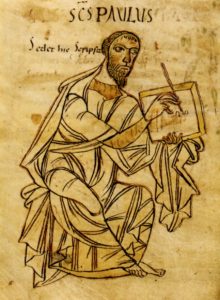 Here, Paul describes God as the living and true God. Jesus is not the true God but the Son whom the true God raised from the dead. Furthermore, on more than one occasion, Paul writes that God is the Father, while Jesus is the Lord. Here are two of those instances:
Here, Paul describes God as the living and true God. Jesus is not the true God but the Son whom the true God raised from the dead. Furthermore, on more than one occasion, Paul writes that God is the Father, while Jesus is the Lord. Here are two of those instances:
1 Thessalonians 1:1 (NASB) Paul and Silvanus and Timothy, To the church of the Thessalonians in God the Father and the Lord Jesus Christ: Grace to you and peace. (emphasis added)
1 Thessalonians 3:11 (NASB) Now may our God and Father Himself and Jesus our Lord direct our way to you; (emphasis added)
In Paul’s second letter to believers in Thessalonica, we find more of the same. Seven times the apostle emphasizes a distinction between God, who is the Father while describing Jesus as the Lord or Christ,[7] positions we are told in Acts 2:36 that God exalted him to.
2 Thessalonians 1:1 (NASB) Paul and Silvanus and Timothy, To the church of the Thessalonians in God our Father and the Lord Jesus Christ: (emphasis added)
2 Thessalonians 2:16-17 (NASB) Now may our Lord Jesus Christ Himself and God our Father, who has loved us and given us eternal comfort and good hope by grace, 17 comfort and strengthen your hearts in every good work and word. (emphasis added)
Neither in the book of Acts nor in Paul’s letters to the church in Thessalonica is Jesus portrayed as God, or is God portrayed as a tri-person being.
If the doctrine of the Trinity and the deity of Christ are foundational doctrines–to the extent that one cannot be saved without believing them–why didn’t Paul proclaim them in Thessalonica or in the other cities he visited on his missionary journeys? The answer is quite simply because the doctrine had yet to be developed. The historical record of the mid-second century, reveals Platonic thought (from the likes of Justin Martyr and others) beginning to impact and alter the theology of the Church.
The revelation that caused the Jews in Thessalonica to stumble was that their long awaited king had to suffer before his exaltation by God, not that Jesus was himself, God. The first century Church taught that Jesus was a man from Nazareth who humbled himself and obeyed the will of his God, even to the point of suffering and death. But God raised His servant from the dead, and those who believe this truth and follow Jesus as Christ and Lord will likewise be raised to new life.
[1] Paul and company presumably went back to Thessalonica on their third missionary journey when they went through the districts of Macedonia. Acts 20:1-5.
[5] Patrick Navas, Divine Truth or Human Tradition, (Indiana: AuthorHouse, 2011), p. 72. Note: Navas is quoting another author in this passage.
[6] 1 Thessalonians 1:1; 1:3; 1:9-10; 3:11; 3:13; 4:14; 5:9; 5:23.
[7] 2 Thessalonians 1:1; 1:2; 1:8; 1:12; 2:13-14; 2:16; 3:5.
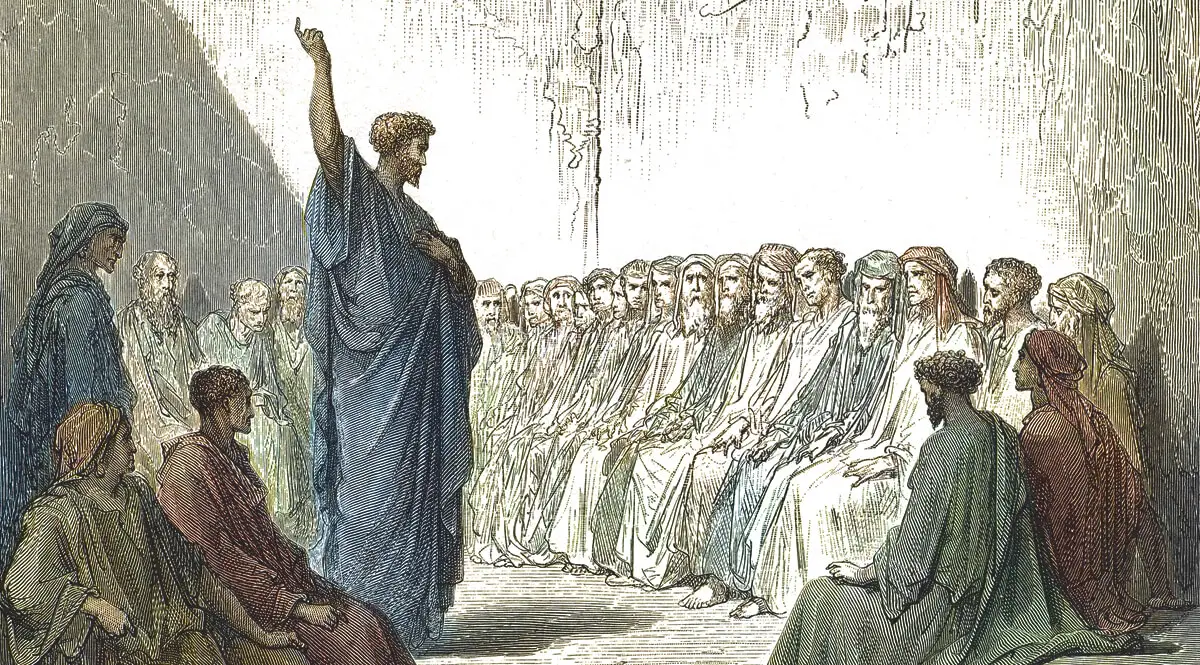
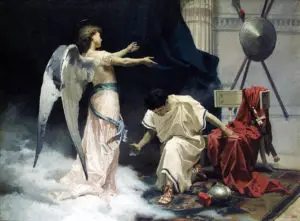
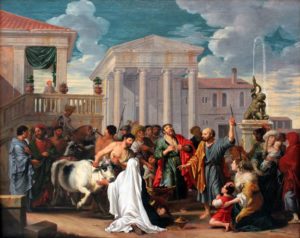

A clear and simple presentation of truth!
Hi Troy,
Thanks for reading and commenting! I appreciate the kind words. May the Lord give us all eyes to see what has been right in front of us all along.
God bless!